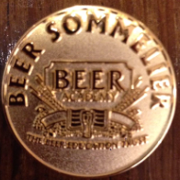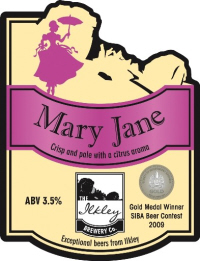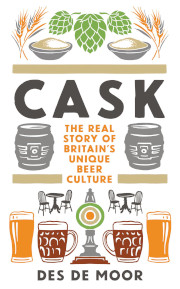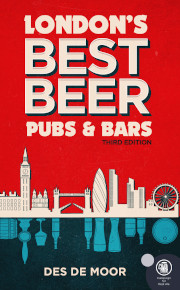European Beer Bloggers Conference 2012
Top Tastings 2012 (Siberia)
ABV: 3.5% and 5.9%
Origin: Ilkley, Bradford, England
Website: www.ilkleybrewery.co.uk
It’s a generational thing, not a Yorkshire thing. When I heard that the Ilkley brewery’s flagship cask ale goes by the name of Mary Jane, it made perfect sense. The name is a reference to a folk song sung to a thumping hymn tune that was not only regarded as Yorkshire’s unofficial national anthem but also once formed part of the repertoire of every English schoolchild, even in Lancashire. The song’s narrator is concerned for the health of an unnamed interlocutor who has apparently been courting someone called Mary Jane in the inhospitable surroundings of Ilkley Moor without wearing a hat:
Tha’s been a cooartin’ Mary Jane
On Ilkla Moor baht ’at…
Tha’s bahn’ to catch thy deeath o` cowd.
However, according to youthful Ilkley brewer, Luke Raven, these days fewer and fewer people recognise the reference. The brewery is in Ilkley itself, an historic spa town nestling in Wharfedale close to some beautiful countryside, not only the Moor to the south but the Yorkshire Dales national park to the north. Although opened in 2009, it’s claimed the name of a previous Ilkley Brewery, operating between 1873-1923 and once one of the biggest in Yorkshire. The new brewery deliberately combines tradition and innovation, producing beers that are admired both by established cask ale fans and “craft beer” drinkers seeking more adventurous flavours, many of whom are doubtless entirely ignorant of Mary Jane and her rustic trysts with bareheaded admirers.
Arriving in Leeds before the European Beer Bloggers Conference (EBBC), I took a Twitter follower’s suggestion and went to lunch at Veritas in Great George Street, which turned out to be an inviting and friendly combination of a beer bar, tearoom and deli in the care of small pubco Market Town Taverns. A cask session beer with a resonant name from a relatively local brewery seemed a good choice to start my sojourn in Yorkshire, so I ordered a Mary Jane.
The beer is a crisp golden ale of the type that’s now become so ubiquitous and popular on the British cask scene, but with more hops than is typical, including large quantities of US variety Amarillo. Pulled northern-style through a sparkler and in immaculate condition, this very pale straw coloured beer had a close and foamy white head and a lovely floral and citric aroma with a firm cereal note beneath.
Some people say the beer is unbalanced but I found it integrated well on the drying palate, with plenty of spicy and rooty bitter flavours offset by cheerfully refreshing citrus and a sweet fruit hint. There was plenty of soft malty body in the drying finish which soon developed crackly and earthy pepper hop flavours without becoming overpowering. Overall it’s an impressive beer for its notably low strength.

Ilkley Siberia Rhubarb Saison
Ilkley then popped up at the conference, with their Lotus IPA featuring in a tasting session, but Luke was also sharing bottles of a recent special, Siberia, a ‘rhubarb saison’ created with beer writer Melissa Cole. The designation ‘saison’ is now used very loosely in the English speaking brewing world, appearing on beers with only a remote connection to Belgian classics like Saison Dupont to connote a vaguely rustic funkiness, and its use here is equally questionable, although it does use a saison yeast. But aside from that, it’s a thoroughly delightful beer.
The rhubarb is particularly appropriate as it’s something of a local delicacy – a little way south of Ilkley, on the other side of Leeds, is the ‘rhubarb triangle’ producing Yorkshire forced rhubarb, which now enjoys EU Protected Designation of Origin status. But though this tart dessert plant now seems as Yorkshire as pudding, it originated in Siberia, thus the name. The hops also evoke more distant climes – Slovenian Celeia, Czech Žatec, Australian Galaxy and New Zealand Pacific Hallertau.
So far Ilkley’s regular bottled beers have been filtered but Siberia has happily been bottle conditioned in saison style. It poured a lively, cloudy yellow with some white head. A definite slightly stinky yeast note with a faint hint of buttery diacetyl rose over light grains and a twist of lemon in the aroma. The lemon note persisted in the palate, but with an emerging dry hoppiness over the citric tang that developed quite a bitter punch without becoming overpowering. There were some funky and spicy notes and even a hint of clove.
A bitterish finish turned out to be rather clean and refreshing, with more citric flavours, a hint of exotic perfume and lingering hops. The rhubarb might not have been noticed if you didn’t know it was there, but it did add a dry tartness to this very distinctive and drinkable beer. Well worth looking out for.
Update, March 2013. I’ve subsequently tried Siberia in two different draught formats.
At the Great British Beer Festival in Autumn 2012, the cask version had a good white head and a tart, spicy and lightly flowery aroma with a touch of toffee and cream. A coriander-like note floated on a toffeeish complex palate with tart apple flavours and lots of spice. A smacky finish had chewy hops and a light nutty bitterness, making for a very pleasant and tasty beer.
A lively keykeg version sampled that same month at the Earl of Essex, London N1, was even better, yielding a very spicy aroma with obvious rhubarb notes alongside flowery malt. A lightly tangy palate was again very spicy with a note of tart astringency among soft wheaty cereal and fruit. The tartness persisted in the finish with drying hops, soft fruit and a hint of custard.






Leave a Reply